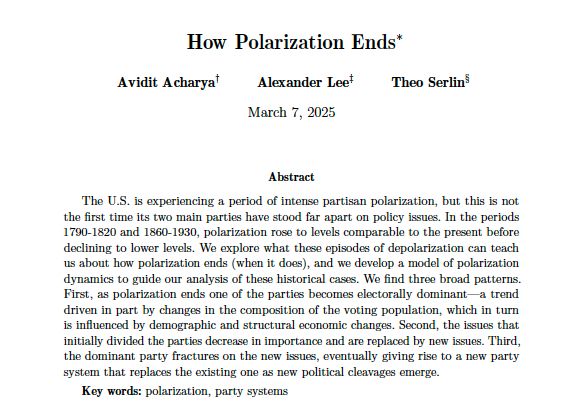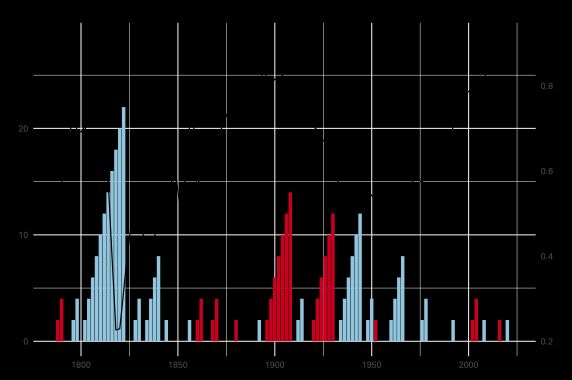A lot has been written on the causes of polarization, but Avidit Acharya, Theo Serlin and I wanted to ask a different question: How Polarization *Ends*
Paper link and 🧵
tinyurl.com/jp2pk4rt
1/10
This is not the first time American politics have been polarized. Polarization has increased before and has ended before.
And the reasons it ends are not necessarily the reasons it begins.
2/10
We look at two spikes of polarization that later ended: The First Party System when Federalists and Dem.-Republicans were polarized on the constitution and foreign policy, and the Third/Fourth Party Systems when Dems and Reps were polarized on the tariff and Reconstruction.
3/10
Our big finding: Polarization will last as long as the parties remain competitive, and end after one party becomes dominant
There is no convergence toward the center or the median voter
See how DWnominate cong. polarization falls after long periods of unified government
4/10
The second pattern is that when polarization ends, new issues emerge that replace the old issues in importance.
You can think of it as losing party finding new things to talk about. The Democrats weren't winning on low tariffs and racism, but they could win on the New Deal
5/10
At same time, the dominant party factionalizes on the new issues. The Dem.-Republican party factionalized on Andrew Jackson and internal improvements in the 1820-30s, the Republicans split between progressives and conservatives on regulatory issues in the 1900-20s
6/10
What causes one party dominance? Demographic and structural economic factors were important. For example, westward expansion added new voters who were disposed to support the Dem.-Republicans.--no Federalist presidential candidate ever won a state that was added after 1796
7/10
The declining party, realizing that the trends are working against it, engages in anti-majoritarian tactics to try to slow those trends. The Federalists opposed the Louisiana purchase and proposed a supermajority requirement to admit new states to the union.
8/10
The main lesson for today is that polarization will continue as long as the parties remain relatively competitive in elections
Unfortunately, they *have* been very competitive, switching power and control of Congress every two to six years, with no sign of stopping.
9/10
There are several important caveats about drawing lessons from historical cases, and about the cases themselves. Read the paper for those!
10/10

